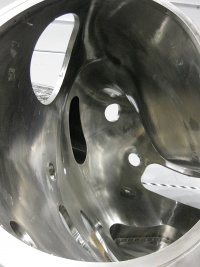Stellarator: Difference between revisions
Jump to navigation
Jump to search
| (50 intermediate revisions by 5 users not shown) | |||
| Line 1: | Line 1: | ||
A stellarator is a magnetic confinement device. | A stellarator is a [[Magnetic confinement|magnetic confinement]] device. The [[Rotational transform|rotational transform]] is predominantly generated by external coils - as opposed to a [[Tokamak|tokamak]], in which the poloidal field is generated by plasma currents. Hybrid concepts (including the concepts known as quasi-[[axisymmetry]] and quasi-[[omnigeneity]]) employ both external coils and self-generated ([[Bootstrap current|bootstrap]]) currents (e.g. NCSX). | ||
[[File:NCSX_plasmaVessel.jpg|200px|thumb|right|NCSX plasma vessel.]] | |||
== Classification of stellarators == | |||
Somewhat arbitrarily, stellarators may be classified according to the type of magnetic configuration. | |||
* Torsatron / Heliotron: the [[rotational transform]] is produced by an external helical coil surrounding the plasma. | |||
* Heliac: a stellarator with a toroidally helical magnetic axis. | |||
* Helias: advanced stellarator with [[modular coil]]s. | |||
== Defunct stellarators == | == Defunct stellarators == | ||
* | * ATF (Oak Ridge, TN, USA) | ||
* [ | * CHS (Japan) | ||
* [[ | * [http://prl.anu.edu.au/H-1NF H-1NF] (Canberra, Australia) | ||
* [http://ncsx.pppl.gov/ NCSX] (Princeton, NJ, USA) - cancelled before construction was completed | |||
* [[W7-AS]] (Garching, Germany, 1988-2002) | |||
== Operational stellarators == | == Operational stellarators == | ||
* [[ | |||
* [[ | * [http://fusion.auburn.edu/ CAT/CTH] (Auburn, USA) | ||
* [[ | * [http://www.center.iae.kyoto-u.ac.jp/plasma/index.html Heliotron-J] (Kyoto, Japan) | ||
* [[ | * [[HSX]] (Madison, WI, USA) | ||
* [[TJ-K]] (Germany) | * [http://www.lhd.nifs.ac.jp/en/ LHD] (Toki, Japan) | ||
* [[ | * [[Wikipedia:SCR-1|SCR-1]] (Cartago, Costa Rica) | ||
* [[TJ-II]] (Madrid, Spain) | |||
* [[TJ-K]] (Stuttgart, Germany) | |||
* [http://tsubaki.qse.tohoku.ac.jp/study/heliac/index.html TU Heliac] (Tohoku Univ., Sendai, Japan) | |||
* [http://www.fusionvic.org/ UST-1] (Spain) - tabletop experiment | |||
* [http://www.ipp.mpg.de/ippcms/eng/for/bereiche/e3/projekte/wega.html WEGA] (Greifswald, Germany) | |||
* [[W7-X|Wendelstein 7-x (W7-X)]] (Greifswald, Germany) | |||
== Future stellarators == | == Future stellarators == | ||
* [ | * [http://web.utk.edu/~qps/ QPS] (in design phase, TN, USA) | ||
* [ | * [http://estell.blog.uhp-nancy.fr STELL] (in design phase, University of Lorraine, France, in collaboration with IPP Greifswald) | ||
== See also == | == See also == | ||
* [[Stellarator reactor]] | * [[Stellarator reactor]] | ||
* [[Stellarator optimization]] | |||
* [[International Stellarator and Heliotron Workshop]] | |||
* [[Coordinated Working Group Meeting]] | |||
* [[Stellarator symmetry]] | |||
* [http://www.ornl.gov/sci/fed/stelnews/ Stellarator News] | |||
* [http://aries.ucsd.edu/ARIES/ ARIES Project] (conceptual design of a compact stellarator) | |||
* [http://www.highfactor.com/ss/ Spherical Stellarator] design study | |||
== References == | |||
* M. Wakatani, Stellarator and Heliotron devices, Oxford University Press, New York and Oxford (1998) {{ISBN|0-19-507831-4}} | |||
* P. Helander, ''Theory of plasma confinement in non-axisymmetric magnetic fields'', [[doi:10.1088/0034-4885/77/8/087001|Rep. Prog. Phys. 77 (2014) 087001]] | |||
Latest revision as of 21:42, 10 April 2023
A stellarator is a magnetic confinement device. The rotational transform is predominantly generated by external coils - as opposed to a tokamak, in which the poloidal field is generated by plasma currents. Hybrid concepts (including the concepts known as quasi-axisymmetry and quasi-omnigeneity) employ both external coils and self-generated (bootstrap) currents (e.g. NCSX).

Classification of stellarators
Somewhat arbitrarily, stellarators may be classified according to the type of magnetic configuration.
- Torsatron / Heliotron: the rotational transform is produced by an external helical coil surrounding the plasma.
- Heliac: a stellarator with a toroidally helical magnetic axis.
- Helias: advanced stellarator with modular coils.
Defunct stellarators
- ATF (Oak Ridge, TN, USA)
- CHS (Japan)
- H-1NF (Canberra, Australia)
- NCSX (Princeton, NJ, USA) - cancelled before construction was completed
- W7-AS (Garching, Germany, 1988-2002)
Operational stellarators
- CAT/CTH (Auburn, USA)
- Heliotron-J (Kyoto, Japan)
- HSX (Madison, WI, USA)
- LHD (Toki, Japan)
- SCR-1 (Cartago, Costa Rica)
- TJ-II (Madrid, Spain)
- TJ-K (Stuttgart, Germany)
- TU Heliac (Tohoku Univ., Sendai, Japan)
- UST-1 (Spain) - tabletop experiment
- WEGA (Greifswald, Germany)
- Wendelstein 7-x (W7-X) (Greifswald, Germany)
Future stellarators
- QPS (in design phase, TN, USA)
- STELL (in design phase, University of Lorraine, France, in collaboration with IPP Greifswald)
See also
- Stellarator reactor
- Stellarator optimization
- International Stellarator and Heliotron Workshop
- Coordinated Working Group Meeting
- Stellarator symmetry
- Stellarator News
- ARIES Project (conceptual design of a compact stellarator)
- Spherical Stellarator design study
References
- M. Wakatani, Stellarator and Heliotron devices, Oxford University Press, New York and Oxford (1998) ISBN 0-19-507831-4
- P. Helander, Theory of plasma confinement in non-axisymmetric magnetic fields, Rep. Prog. Phys. 77 (2014) 087001